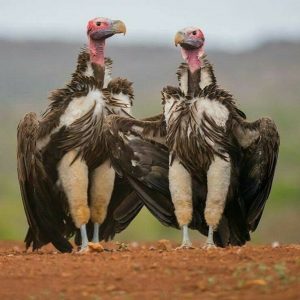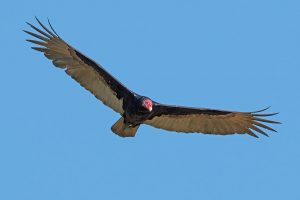Turkey vultures (Cathartes aura) are frequent flyers in our wild skies. Teetering on their long wings, these aerial scavengers love to glide up and down the Fox River Valley.
Turkey vultures are large, dark feathered birds with bald red heads. They hold their wings at a slight dihedral (“V” shaped) and the wing tips are ragged. Seen from below, the pale underside of their flight feathers contrast with their darker forewing.
Peaceful Gourmet’s

Vultures are not killers. Their preferred food consists of fresh carrion. They use their well-developed sense of smell (rare in the bird world) to locate the putrescent perfume emanating from a carcass. They find the majority of this food in landfills, construction sites, and along rural highway shoulders.
While these birds may be common sights, their nests are not. Vultures rarely locate their nests close to humans, selecting to use cool hollow trees, rock crevasses, and abandoned farm buildings. The female will not construct a nest but will fashion a small area for her eggs (typically 2) by moving aside leafy debris. The youngsters are fed a lovely repast of regurgitated, rancid flesh. Vultures may use the same nest site for many consecutive years.
Vultures can’t vocalize. This is not by choice. Through her pioneering work on the anatomy of turkey vultures, Mildred Miskimen reported the absence of a syrinx, the tracheal organ used by most birds to sing their wonderful songs.
Keepin’ Cool?
Nature has provided turkey vultures with a body well equipped for peeing on itself. The bird’s urinary tract is positioned to simultaneously drain both urine and feces down the vulture’s long, pink, featherless legs. Scientists call this  urohydrosis and believe it may be used in regulating body temperature. Urine, of course, cools the legs as it evaporates.
urohydrosis and believe it may be used in regulating body temperature. Urine, of course, cools the legs as it evaporates.
In addition, the powerful uric acid found in vulture pee may act as a sterilizing agent, protecting the bird from toxins it picks up while wading through a meal of decaying meat.
Turkey vultures have become wonderfully trendy in recent decades. Today, many communities celebrate the vulture’s role as one of nature’s garbage collectors. The wonderful hippie town of Makanda, Illinois holds their event on the 3rd weekend in October, a time when several hundred Turkey vultures soar through the hazy southern Illinois skies during their autumn migration.

